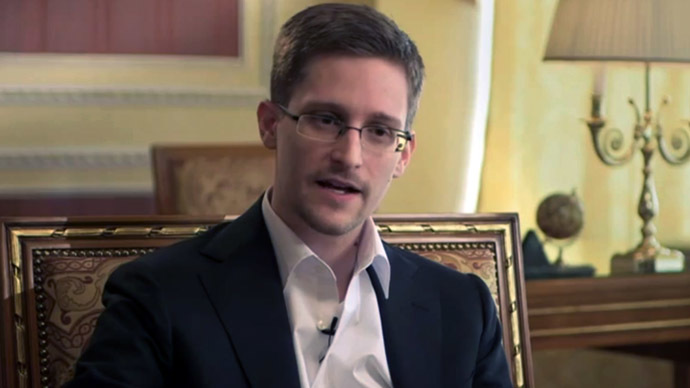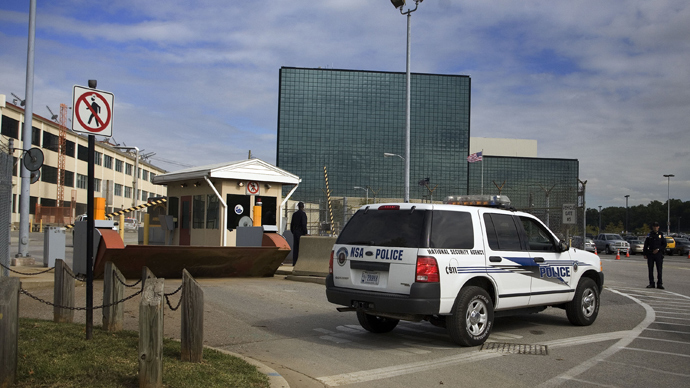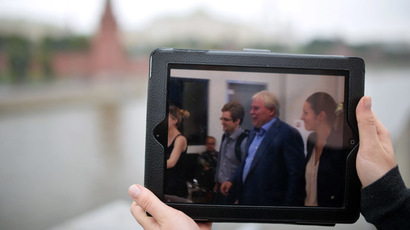NSA is after industrial spying – Snowden to German TV

The NSA agency is not preoccupied solely with national security, but also spies on foreign industrial entities in US business interests, former American intelligence contractor, Edward Snowden, has revealed in an interview to German TV.
Edward Snowden chose the German ARD broadcaster to make his first TV interview ever since he became a whistleblower. The interview was made in strict secrecy in an unspecified location in Russia, where Snowden is currently living under temporary asylum.
“There is no question that the US is engaged in economic spying,” said Snowden.
If an industrial giant like Siemens has something that the NSA believes “would be beneficial to the national interests, not the national security, of the United States, they will go after that information and they'll take it,” the whistleblower said, giving an example.

Edward Snowden disavowed participation in any future publications of the documents he withdrew from the NSA databanks, saying in the same interview that he no longer possesses any NSA data. The information has been distributed among a number of trustworthy journalists, who are going to decide for themselves what to make public and in what sequence.
The full 30-minute version was aired at 11pm local time (22:00 UTC) on Sunday.
The former NSA contractor’s revelations about US global spying activities, including snooping on its closest allies, put transatlantic ties “to the test,” said German Chancellor Angela Merkel last November and demanded that Washington give Germany clarity over the future of the NSA in the country.
Snowden’s revelation hit Berlin particularly hard because Germany is a non-Anglophone country, and therefore is not a member of the ‘Five eyes’ intelligence alliance that incorporates NSA-equivalent agencies in Britain, Canada, Australia and New Zealand, Deutsche Welle points out. While members of the ‘Five eyes’ were exchanging intelligence on a regular basis, Berlin had to consider itself satisfied with less data, while both Washington and London, for example, were blatantly listening to German Chancellor Angela Merkel’s cell phone right in the middle of Germany’s capital.
The Germans - according to polls – have lost confidence in the US as a trustworthy partner, and the majority of them consider NSA whistleblower Edward Snowden a hero.

In order to mend fences, US President Barack Obama made a rare appearance on German TV. On January 18 President Obama told the ZDF TV channel that “As long as I'm president of the United States, the chancellor of Germany will not have to worry about this.”
Yet Germany remains skeptical about US promises of discontinuing spying on foreign leaders, and is in the vanguard of a number of European countries aiming to change data privacy rules in the EU.
Former NSA contractor, Edward Snowden, remains in Russia, where his temporary political asylum status could be extended every year. He has no plans for returning to the US where he would face trial for alleged treason.
“Returning to the US, I think, is the best resolution for the government, the public, and myself, but it’s unfortunately not possible in the face of current whistleblower protection laws, which through a failure in law did not cover national security contractors like myself,” said Snowden during his public Q&A session last Thursday.
‘There are significant threats but I sleep very well’
Snowden said in the interview that there is “significant threat” to his life but he “sleeps well,” as he believes he had done the right thing.
"These people, and they are government officials, have said they would love to put a bullet in my head or poison me when I come out of the supermarket, and then watch as I die in the shower," he said in reference to a report published by US website BuzzFeed which cited explicit threats against Snowden made by unnamed Pentagon and NSA officials.
"There are significant threats but I sleep very well," he said in the interview that took place last Thursday.

In response to the reported threats, Snowden’s lawyer, Anatoly Kucherena, said that Snowden will ask Russian law enforcers to protect him. He stressed that death threats carry criminal liability in Russia.
Snowden’s refugee status means he is fully entitled to ask the police for help, the lawyer said.
Speaking to Russian TV channel Vesti 24, Kucherena said that Snowden is constantly accompanied by private guards, but added that such security “might not be enough” to ensure his safety.
The lawyer said he will demand that US authorities look into the threatening statements published in US media, adding that their authors should be identified.
Speaking on Sunday, Snowden’s American legal adviser said that
the whistleblower would be willing to enter talks with US
Attorney General Eric Holder to negotiate his return to the
United States, but not without a guarantee of amnesty.
"It's a little disheartening that [Holder] seemed to take
clemency and amnesty off the table, which are two of the
negotiating points," Jesselyn Radack told NBC.














